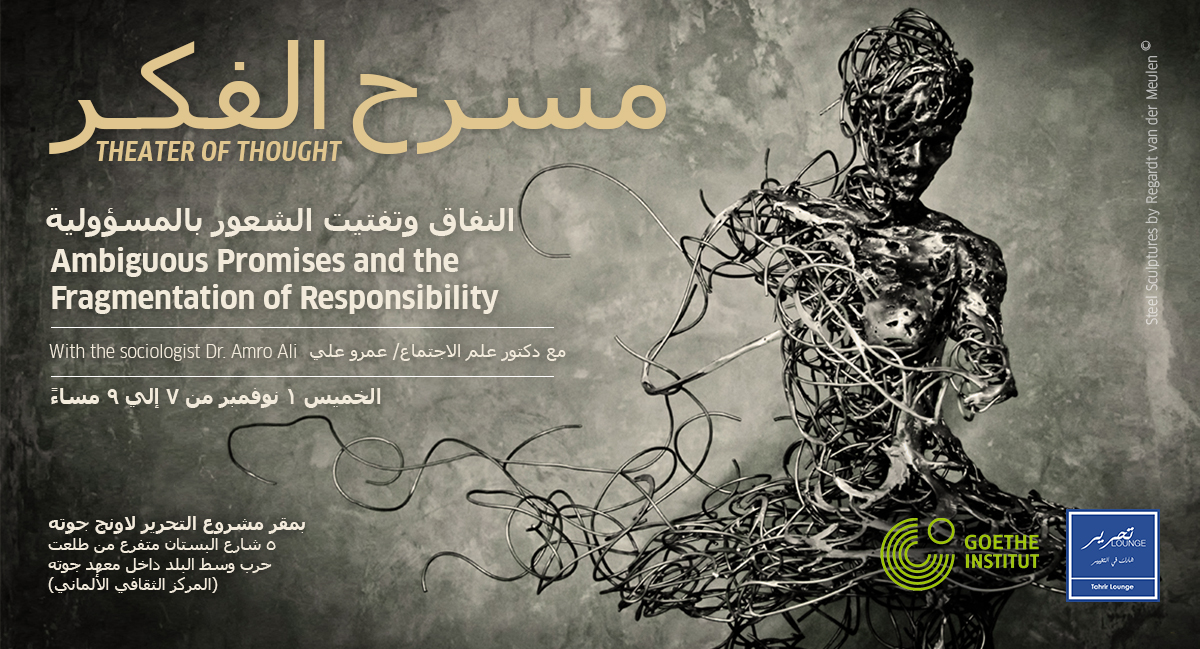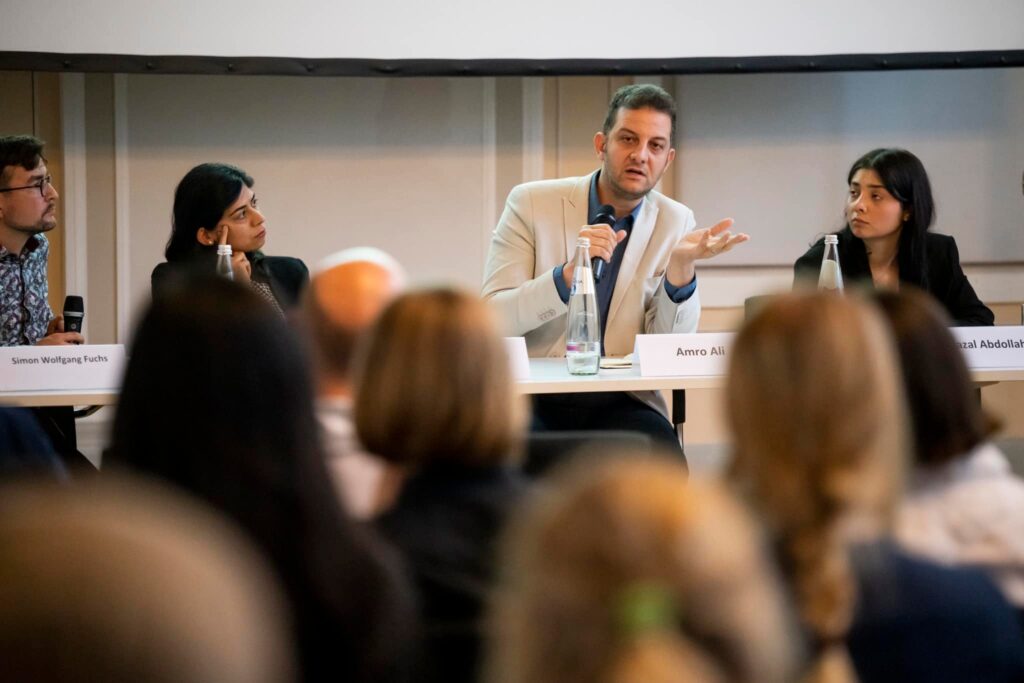The next Theatre of Thought lecture, Ambiguous Promises and the Fragmentation of Responsibility, will take place on 1st November 2018 at Goethe’s Tahrir Lounge. The session will be in Arabic.
Click here for the Facebook event. “Responsibility has traditionally meant a duty of care to someone or power over something, a moral obligation to act deferentially to another, and to be held accountable for the good or bad that might unfold under one’s control. These meanings typically aggregate and animate within the idea of a citizen. Yet in recent decades, the undermining of responsibility was soundly argued to be the fault of the consumer encroaching on the citizen category. Responsibility, the hallmark of the citizen, is being degraded by the consumer that lacks responsibility due to the tendency to follow personal inclinations. However, these blurred lines simply paved the way for the problems of the digital age that are exacerbating the diminishing of responsibility.
“Responsibility has traditionally meant a duty of care to someone or power over something, a moral obligation to act deferentially to another, and to be held accountable for the good or bad that might unfold under one’s control. These meanings typically aggregate and animate within the idea of a citizen. Yet in recent decades, the undermining of responsibility was soundly argued to be the fault of the consumer encroaching on the citizen category. Responsibility, the hallmark of the citizen, is being degraded by the consumer that lacks responsibility due to the tendency to follow personal inclinations. However, these blurred lines simply paved the way for the problems of the digital age that are exacerbating the diminishing of responsibility.
The notion of responsibility is dependent on temporal conditions and the supposition of obligations that make acts of trust, promise, and forgiveness possible in order to heal the past and stabilize and secure a steadfast future. However, what does it mean for responsibility when today’s digital communications are perilously thrusting the individual into a world of arbitrariness, non-binding obligations, and short-term gains? Rapidly, responsibility is torn from its past and future commitments as the present is pushed as the absolute priority and, therefore, it is scattering time into, as German-Korean philosopher Byung-Chul Han would argue, ‘a mere sequence of purely disposable presences.’
This seminar will explore further questions of consequence. Among them, if it is possible to delineate the features of passivity that overwhelms responsible agency? Does the slow brewing of trust required to form a mature social praxis lose meaning when hyper-visibility is all-pervasive, privacy is suspected, and rapid information access is readily available? or given that responsibility is tied to names and naming in order to confer recognition, then what are the implications of perceiving the other, in terms of trustworthiness and reliability, when they are dissolved in a digital swarm?”
—–
يستكمل مشروع #التحرير_لاونج_جوته سلسلة حلقات #مسرح_الفكر الموسم الثاني بخامس حلقاته ومحاضرة تحت عنوان “النفاق وتفتيت الشعور بالمسئولية”، والتي سيتناول فيها المتحدث بالندوة د. عمرو علي موضوع المسئولية بأشكالها في العصر الحديث، والاثار المترتبة على تطبيقها في ظل العصر الرقمي الذي نعيشه الان.
تعني المسئولية على نحو تقليدي واجب الرعاية لشخص ما أو السلطة على شيء ما، التزام أخلاقي للتصرف بشكل مختلف عن الآخر، وتحمل المسؤولية عن الخير أو الشر التي قد تتكشف تحت سيطرة المرء. هذه المعاني عادة ما تكون مجمعة ومتحركة في إطار فكرة المواطن. لكن في العقود الأخيرة، قيل إن تفويض المسؤولية كان خطأ المستهلك الذي ينتهك فئة المواطن. إن المسؤولية، السمة المميزة للمواطن، تتعرض للتدهور من جانب المستهلك الذي يفتقر إلى المسؤولية بسبب الميل إلى اتباع الميول الشخصية. ومع ذلك، فإن هذه الخطوط غير الواضحة مهدت الطريق ببساطة لمشاكل العصر الرقمي التي تؤدي إلى حدة تناقص المسؤولية.
يعتمد مفهوم المسؤولية على الظروف الوقتية وفرض الالتزامات التي تجعل أعمال الثقة والوعد والمغفرة ممكنة من أجل مداواة الماضي وتحقيق الاستقرار وتأمين مستقبل راسخ. ومع ذلك، ما الذي تعنيه المسؤولية عندما تكون الاتصالات الرقمية اليوم هي التي تدفع الإنسان إلى عالم من التعسف والتزامات غير ملزمة ومكاسب قصيرة الأجل؟ بسرعة، انشقت المسؤولية عن التزاماتها السابقة والمستقبلية، حيث يتم دفع الحاضر كأولوية مطلقة، وبالتالي فإن الوقت قد بدأ يتناثر، كما يقول الفيلسوف الألماني-الكوري بيونغ-شول هان، “مجرد تسلسل للوجودات التي يمكن التخلص منها على نحو مجرد.”
هذه الندوة -التي ستنعقد يوم الخميس 1 نوفمبر الساعة 7 – 9 مساءً بمقر مشروع التحرير لاونج جوته- سوف تكشف العديد من الأسئلة الناتجة. من بينهم، إذا كان من الممكن تحديد ملامح السلبية التي تكتسح الوكالة المسؤولة؟ هل الثقة البطيئة المخمرة مطلوبة لتشكيل تطبيق عملي اجتماعي ناضج تفقد معنى عندما تكون الرؤية الفائقة منتشرة، الخصوصية مشتبه بها، والوصول السريع للمعلومات متاح بسهولة؟ أو إذا كانت تلك المسؤولية مرتبطة بأسماء وتسمية من أجل منح الاعتراف، ثم ما هي الآثار المترتبة على إدراك الآخر، من حيث الثقة والدقة، عندما يتم حله في سرب رقمي؟






